By Jennifer Plant Johnston
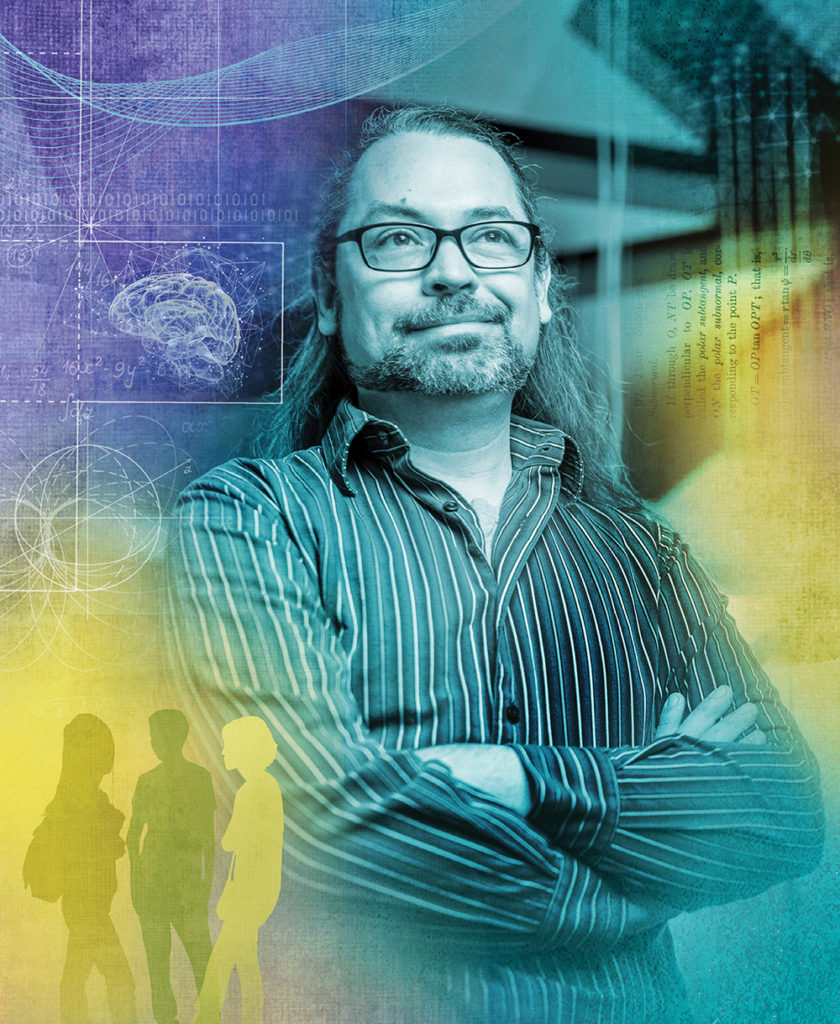
Obsessed with the need to understand how things work, Dave Caudel remembers being told for much of his life that he asks too many questions.
Then he found a place where his natural hardwiring thrived.
“When I entered the lab for the first time, I discovered a world where there’s no such thing as ‘too many questions.’ Being curious and driven to understand things is what makes good science,” says Caudel, a postdoctoral scholar working with the Frist Center for Autism and Innovation.
The new center will be housed in the School of Engineering and was endowed in fall 2018 by a $10 million gift from Jennifer Frist, BS’93, and her husband, Billy. It seeks to transform workplaces by developing new technologies based on the specific skills and talents of people with autism, effectively inspiring advances that can lead to meaningful employment and a fuller life.
“I have firsthand experience of how difficult it is integrating into a neurotypical world,” Caudel says. “As a father, I’m also worried about what kind of world my children are entering, and that motivates me to try and make it better.”
As an undergraduate Caudel was diagnosed with Asperger’s syndrome, a condition considered part of autism spectrum disorder (ASD), in which individuals tend to function at high levels. Caudel has three children, each of whom also is on the spectrum to some degree.
To Jennifer Frist, Caudel’s unique perspective is invaluable. “It is so important that Dave Caudel is involved with the center,” she says.
As one of only nine women computer science majors in the School of Engineering while she was an undergraduate at Vanderbilt, Frist personally understands what it means to provide a diverse viewpoint. She gained additional perspective when she and her husband learned their firstborn son, now a teenager, is on the autism spectrum.
Initially, they focused on finding resources for their child, many of which were provided by the Vanderbilt community. As he grew, so did their desire to make a difference.
“Vanderbilt’s always been a leader in the autism world,” Billy Frist says. “We’re really excited to be taking this next step to see what innovation develops.”
In 1965 the Kennedy Center for Research on Human Development opened at the former Peabody College for Teachers with support from a federal grant and private philanthropy. It quickly established itself as one of the nation’s leading centers on research around learning and development. Three years later the Susan Gray School—originally named the Peabody Experimental School—opened on campus with a mission to educate differently abled students alongside their typically developing peers.
Today, Vanderbilt continues to be a global leader across a broad array of autism research and support. The Kennedy Center’s Treatment and Research Institute for Autism Spectrum Disorders, or TRIAD, conducts interdisciplinary research on autism while using its discoveries to provide services to individuals with autism and their families.
The Kennedy Center also is home to many faculty members affiliated with the Vanderbilt Brain Institute and researchers in the emerging field of educational neuroscience, such as Laurie Cutting, the Patricia and Rodes Hart Professor of Special Education and professor of pediatrics. Educational neuroscience helps convert findings from neuroimaging into viable classroom strategies for children with learning disabilities.
Similarly, the Department of Psychiatry and Behavioral Sciences recently formed the Psychiatry Autism Research Team, which is dedicated to understanding, supporting and embracing the social, sensory and emotional experiences of individuals with autism.
The new Frist Center for Autism and Innovation began as part of the Vanderbilt Trans-Institutional Programs initiative, which provided seed money to create an initial working group. Keivan Stassun, Stevenson Professor of Physics and Astronomy and professor of computer science—who led the TIPs initiative and now serves as the Frist Center’s director—also received a $1 million Howard Hughes Medical Institute award that allowed him to direct additional energy toward the center’s formation.
The Frist endowment was instrumental in solidifying the new center. At the beginning of the 2019–20 academic year, the center will move to space in Vanderbilt’s Innovation Pavilion in the Engineering and Science Building, adjacent to Olin Hall.
“I couldn’t think of a more appropriate home for the center,” Stassun says. “The clear connection to innovation and entrepreneurship not only sends the right message, but it also allows us to provide Vanderbilt Immersion experiences for a new generation of students who are interested in out-of-the-box ways of harnessing technology and market forces to make the world a better place.”
EASING THE JOURNEY TO ADULTHOOD
Caudel says around 85 percent of the adult autistic population is currently unemployed or underemployed. At a time when employers are struggling to find skilled labor, developing new technologies and methodologies to help accommodate individuals with autism in the workplace could help fill an important need.
“We know that many of these individuals, in the right environment, would absolutely thrive as a valuable asset in the workplace,” Caudel says. “It’s all a matter of finding the right work and fostering a supportive environment.”
Philippe Fauchet, who holds the Bruce and Bridgitt Evans Dean’s Chair in Engineering, was an early champion of the autism and innovation TIPs grant. He believes that tapping into the abilities of all people—including neurodiverse individuals—holds the key to future innovation in rapidly developing fields like artificial intelligence.
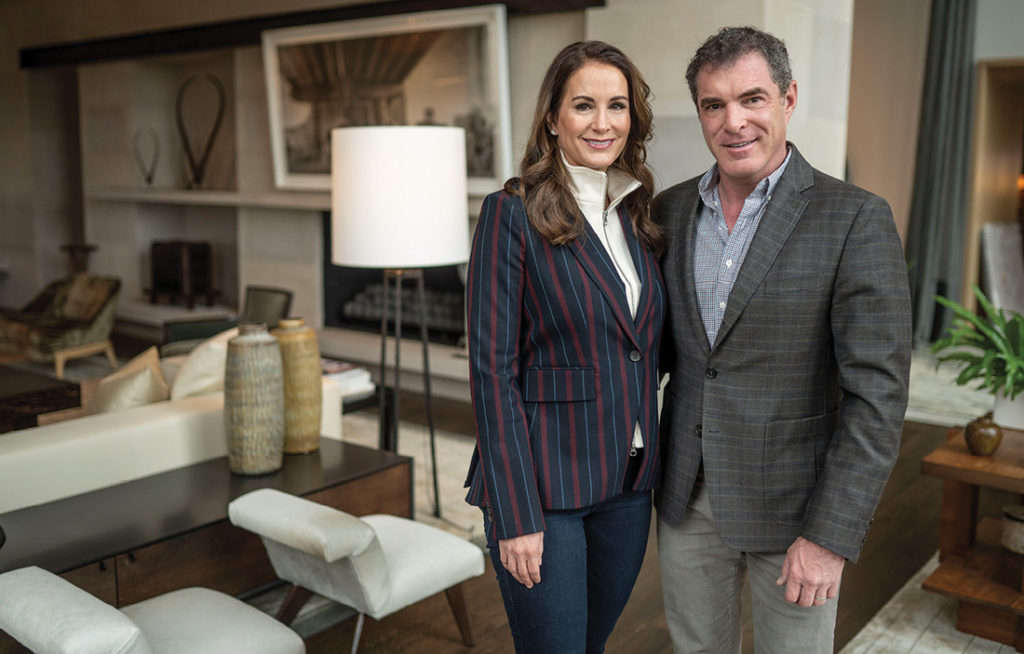
“Applying our work across disciplines is our hallmark, and we are good at it. But this is far more than research. This is personal to us,” Fauchet says. “Like many who are involved with this program, I have a child on the spectrum, so we understand not only the challenges but also the amazing potential this population offers.”
Employing people on the spectrum is not charity, Jennifer Frist says. “It needs to make sense for both the individual with autism and their employer.”
While each person with autism is different, and the spectrum has widened in recent years, many tend to crave structure and are highly organized, she says.
“If you can harness those gifts and abilities, these individuals are often more productive and efficient than their neurotypical peers. Those types of traits can become real assets for companies,” Frist says.
What’s more, diverse teams have been shown to enhance problem-solving abilities, Stassun says. “That’s why companies tend to have active diversity and inclusivity programs. It’s not just because they want to do the right thing. They want to benefit from the innovation advantage that comes from diversity.”
After all, he says, neurodiversity is just another facet of diversity.
FROM ALIEN TO INTEGRAL TEAM MEMBER
Caudel knows what it’s like to finally arrive in an environment “where people appreciate how my mind works.” He spent years feeling, quite literally, like an alien. The neurotypical world wasn’t easy to navigate.
Caudel served in the U.S. Army for seven years after high school, working as a writer, photographer and media relations specialist.
Becoming a soldier fulfilled a lifelong dream, but it didn’t mesh with his questioning mind. “Many folks are comfortable working without understanding the underlying ‘why,’ but I find that very distracting,” he says. “I have this obsessive need to understand things.”
After the Army he couldn’t find work as a journalist without a college degree, so he sold cars, reasoning it would help improve his interpersonal skills.
“People arrive on car lots actively hating the stranger who approaches them, and then a few hours later they’re thanking them, handing them tens of thousands of dollars and shaking their hands,” Caudel says. “I thought if I could figure out how to do that, day-to-day interactions with folks would be a cinch.”
After a few years of moderate success in car sales and financing, Caudel felt ready to go to college on the GI Bill. By that time he was in his 30s with young children. He earned a bachelor’s degree in physics at Tennessee State University, followed by a master’s at Fisk University.
Caudel’s diagnosis didn’t come until he was in college. A friend jokingly told him she thought he had what was known at the time as Asperger’s syndrome. Her offhand comment sent him on a quest for more information.
“The more I learned about it, the more I began to realize she could be right,” he remembers. Seeking a professional diagnosis, he was told with 99.8 percent certainty he was on the spectrum.
Caudel welcomed the diagnosis. “Finding my tribe was a powerful experience for me—to know there are people out there who think as I do, see what I see. It’s been 10 years now, and it still chokes me up.”
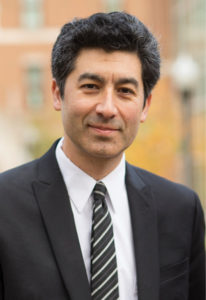
Stassun met Caudel while the latter was earning his Ph.D. in physics through the Fisk–Vanderbilt Master’s-to-Ph.D. Bridge program. After receiving his doctorate in May 2017, Caudel immediately went to work on the TIPs Initiative for Autism, Innovation and the Workforce, from which eventually emerged the new Frist Center.
Although he had trained to become an experimental physicist, he couldn’t pass up the opportunity to make a difference for others in the ASD community. He now has the freedom to focus on his strengths instead of his weaknesses—a freedom he hopes his work will extend to others.
HARNESSING TECHNOLOGY TO OVERCOME BARRIERS
One of the goals of the Frist Center is to harness technological innovation to help overcome barriers that prevent neurodiverse individuals from fully engaging in the workforce. Among the initial projects is a virtual-reality-based driving simulator spearheaded by Nilanjan Sarkar, professor and chair of mechanical engineering.
The simulator helps remove the sensory overload issues associated with learning to drive. Ultimately, this may create opportunities for a driving school for autistic individuals based on the technology, thereby helping teens and adults develop the independence to get to work and hold down a job.
Taking a different approach, Maithilee Kunda, assistant professor of computer science and computer engineering, is developing artificial intelligence algorithms that mimic the visual abilities of many people with autism.
She also is investigating methods of measuring how neurodiverse individuals solve complex problems as compared with neurotypical subjects. That research is making use of new forms of visual cognitive assessments developed by Frank Tong, professor of psychology.
While technological innovation is important, changes also must happen at the organizational level before neurodiverse individuals can fully integrate into the workforce. Timothy J. Vogus, Brownlee O. Curry Jr. Professor of Management, and Julie Lounds Taylor, associate professor of pediatrics and psychiatry and behavioral sciences for the Vanderbilt Kennedy Center, are investigating how organizational practices and processes can be adapted to be more inclusive.
Even small accommodations can make a difference in organizations, Stassun says. For example, he allows members of his own lab to connect to meetings through videoconference to ease the distraction of social interactions.
Stassun’s formative experiences as a new American—he is the son of a single mother of Mexican heritage—led him to become founding director of the Fisk–Vanderbilt Master’s-to-Ph.D. program, which successfully has increased the number of underrepresented minorities seeking graduate degrees in the physical sciences. Having a son with autism further broadened his understanding of diversity.
“By learning how to recognize their abilities and providing appropriate supports, we can all benefit from those among us who are blessed to have gifts for seeing the world differently,” he says.
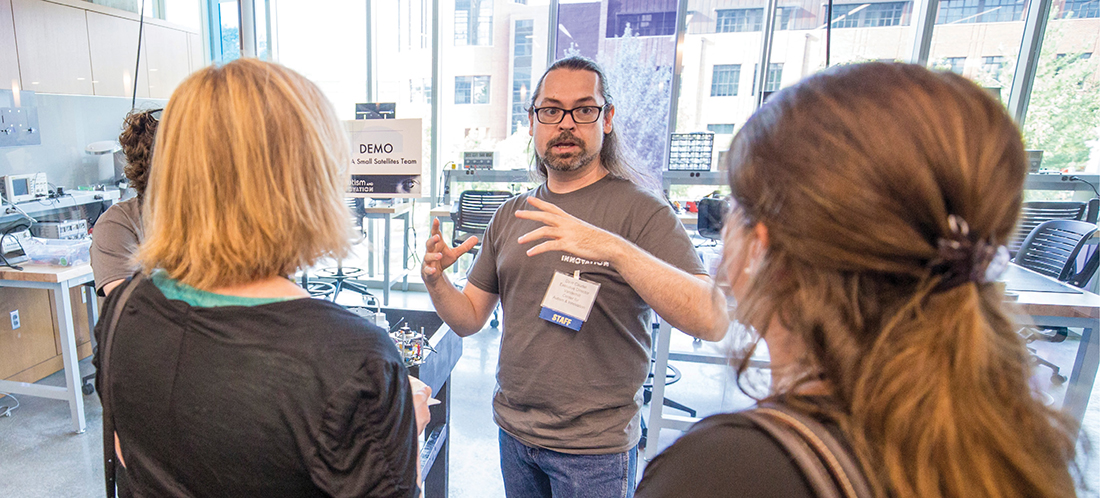
A SENSE OF BELONGING
Caudel has experienced both successes and failures as a scientist, both of which increased his sense of belonging and fed his mind’s craving to understand.
“That’s the joy of science: You either support your hypothesis, or you prove yourself wrong and get excited at the prospect that you’re about to learn something new.”
Caudel believes that, like him, everyone deserves a chance to find their place and to be valued for how their minds work.
“Sometimes I ponder my own journey, all the years stuck in a job I suffered through, then compare that to the joy my life has become, and I literally weep,” he says. “I then think of all my brothers and sisters out there who are still stuck and miserable, and it breaks my heart. If we could help just a few of them to find this kind of belonging and joy, then it’s worth a lifetime of toil to achieve.”
Jennifer Plant Johnston is a Nashville-based freelance writer with more than 30 years of experience, many of them writing for Vanderbilt. A journalism graduate of the University of Tennessee and a former Associated Press reporter, the Oak Ridge, Tennessee, native was executive director of the Vanderbilt Center for Nashville Studies before retiring in 2016 to travel and write.
Watch a video about the Frist Center for Autism and Innovation:
An Evolutionary Advantage
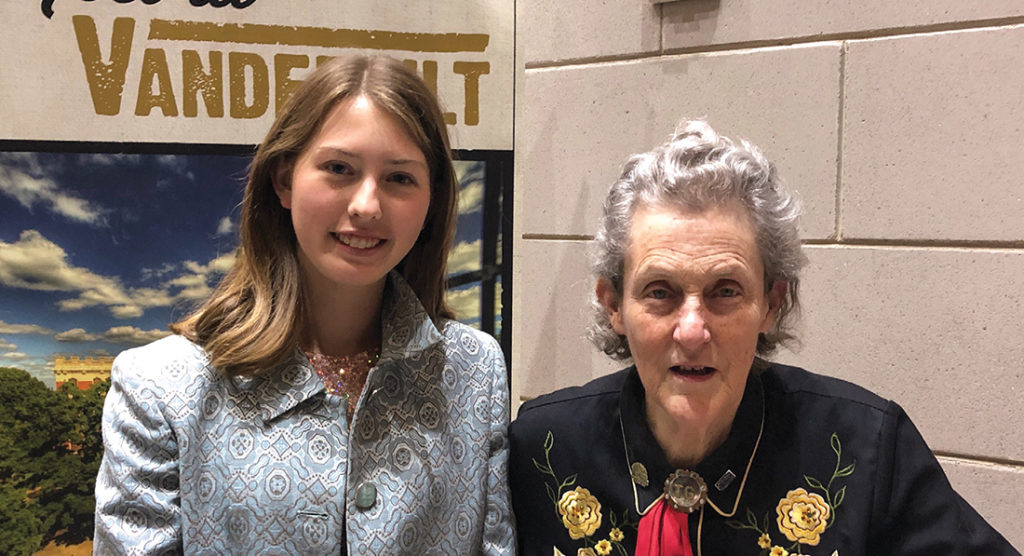
Claire Barnett, a senior majoring in human and organizational development at Peabody College, learned she was on the autism spectrum while in college. For her, that diagnosis came just a year ago.
In November, Barnett met Temple Grandin, an inventor, author, speaker and advocate for the autism community, during Grandin’s time on campus taking part in the Chancellor’s Lecture Series. While at Vanderbilt, Grandin participated in a daylong conference made possible by the Frist Center for Autism and Innovation that explored the future of human–technology partnerships.
Barnett, who works as an intern at the center, looks forward to a day when explaining that she’s on the spectrum won’t put her in the category of “the other.” Perhaps, she says, people will even begin to see that having a different perspective might be an advantage, recalling Grandin’s words that people who think and see the world differently have helped develop everything from electricity to iPhones.
Barnett writes regular columns for The Vanderbilt Hustler to raise awareness about those in the university community living with invisible disabilities. She also founded the Vanderbilt Autism and Neurodiversity Alliance and serves as its president.
“It’s strange that people stigmatize differences, which is why I’ve been so open to writing about them,” says Barnett.
Through her photography and writing, Barnett has successfully matched her strengths—particularly her ability to identify patterns and create visual narratives—to a vocation. In 2017 she worked as a photography intern for the White House, and last summer she served as the sole communications intern in the Office of the Vice President.